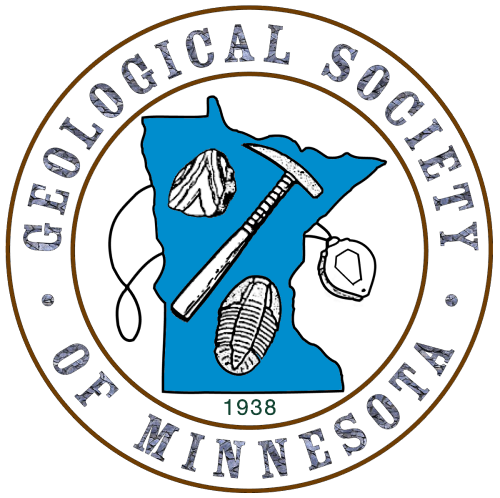Current Year Schedule
GSM seminars with slide show presentations are free and open to the public. They are presented by leading professionals in their fields and are aimed at learners from high school to adult. A question-and-answer session follows each seminar. The labs, also free and open to the public, allow a hands-on learning experience and demonstrate the ideas and principles of geology and earth science. Live lectures and labs require no registration; just show up a few minutes early on the evening of the lecture.
Click on date of any seminar for attendance information and other details. For a printable version of our schedule of seminars and labs, click here.
Except as noted, live lectures during fall 2024 are Mondays at 7:00 PM CT on the University of Minnesota campus, Keller Hall, Room 3-230. The address is 200 Union St. SE, Minneapolis MN. A lecture with (V) following its title is an online virtual lecture. For these, free registration is required by non-members; the instructions are supplied with the lecture description.
Our schedule is planned over 6 months in advance, so changes may occur. Always check this website shortly before each lecture for the latest seminar information.
Winter weather will come and snow might impact our lectures. The GSM will make any decision about cancelling or postponing a lecture due to inclement weather no later than 3:00 PM the day of the lecture. This information will be posted on the GSM home page (http://www.gsmn.org/). So check our home page shortly before each lecture in case there is a cancellation or a last-minute change. Also, we will e‐mail lecture postponement and cancellation information to our members.
Past seminars marked with * were recorded and the recording is available on the Geological Society of Minnesota YouTube channel. Subscribe to this channel for updates.
Seminar Details
Seminar Lab Date: October 14, 2024
Seminar Lab Subject: DAMAGING EARTHQUAKES CONTINUE IN OKLAHOMA NEARLY A DECADE AFTER PEAK WASTEWATER INJECTION (V)
Seminar Lab Presenter: JACOB WALTER, PH.D., STATE SEISMOLOGIST, OKLAHOMA GEOLOGICAL SURVEY
Seminar Lab Location:
Virtual lecture 7:00 PM CT.
Participation instructions will be e-mailed to GSM members. If you are not a member of GSM and wish to attend this free seminar online, register as follows by 8 AM CT Monday, Oct 14: Go to the Contact menu above and select “Ask GSM”. In the form that appears, enter your name and e-mail address. Enter “Nov 25 lecture” in the subject line. In the message body, please enter the city and state or country from which you will view the seminar. You will receive instructions by e-mail prior to the lecture. Check your spam folder if the instructions do not appear in your in-box at least one hour prior to the lecture.
Seminar Lab Detail:
Summary: In Oklahoma, seismicity peaked in 2015 when there were ~900 M3.0+ earthquakes, relative to a tectonic background rate of just 1-2 M3.0+ earthquakes per year prior to 2009. Many of those events are now understood to have been induced by wastewater disposal, some of which caused moderate but not widespread damage to the rural communities in which they occurred. While the rate of earthquakes has significantly declined, such that there were 18 and 20 M3.0+ earthquakes in 2023 and so far in 2024, respectively, seismicity across the state remains several times the rate of pre-2009. In January 2024, there was a series of M4.0+ earthquakes near Edmond, OK, a suburb of Oklahoma City, that were felt widely across the metro area. Then in February 2024, an M5.1 earthquake occurred near the epicenter of the 2011 Prague M5.7 earthquake. Both sequences were seismically active throughout the last decade, with only months-long periods of quiescence since initiation of activity, during a time period of broadly decreasing wastewater disposal. The damaging events, amidst declining injection trends, have important implications for understanding long-lived hazards in areas experiencing human-induced seismicity.
Biography: Dr. Jake Walter is the State Seismologist at the Oklahoma Geological Survey, a University Department and state agency, and affiliate faculty in the School of Geosciences at the University of Oklahoma. He has research interests in earthquake seismology, geohazards, glaciology, and induced seismicity. He is the author of over 40 peer-reviewed publications and has led NSF, DOE, NASA, and FEMA grants. He assists state emergency management and other state agencies with earthquake-related matters and engages in science outreach for audiences at all age levels across the state.
